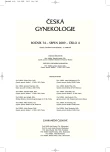Vaginal combined contraception NuvaRing in the clinical practice in the Czech Republic
Authors:
Tomáš Fait
Authors‘ workplace:
Gynekologicko-porodnická klinika 1. LF UK a VFN, Praha, přednosta prof. MUDr. A. Martan, DrSc.
Published in:
Ceska Gynekol 2009; 74(4): 286-291
Category:
Original Article
Overview
Objective:
The aim of this non-interventional, non-comparative, prospective, multicentric study was to evaluate use of vaginal combined contraception NuvaRing in the clinical practice in the Czech Republic.
Design:
Non-interventional, non-comparative, prospective, multicentric study.
Setting:
Department of obstetrics and gynecology, General Faculty Hospital Prague, 1st Faculty of Medicine, Charles University Prague.
Methods:
The cohort of 2134 new users of NuvaRing was followed for 6 months. Questionnaire was filled in by the physician (gynaecologist) three times during the study – before the start of NuvaRing use (baseline), after 3 months and after 6 months of the ring use.
Results:
The average age of women in study was 29,5 years, 68,2% was from 21 to 35 years old. Insertion and removal of the ring were evaluated as easy in 95% of women in the end of the study. Irregular bleeding was mentioned only in 19,7% of women during first 3 cycles and 7,8% during last 3 cycles, mostly (90%) as spotting. Menstrual bleeding was shorter in 62,8% of women in the end of the study compared with the baseline. Dysmenorea decreased by 34,9% and PMS by 28,8% in the last evaluated cycle compared with the baseline. No feeling or only exceptional feeling the of the ring in the vagina was reported in 87% of women and in 77,9% of their sexual partners during the last 3 cycles. The main two reasons why women like NuvaRing was no need to remember anything (57,5%) and easy use (34%). The main reasons why women dislike the ring were feeling of the ring in the vagina in 2,9%, disturbing of sexual intercourse in 2,4% and irregular bleeding in 2%. (90% answered, that they like NuvaRing.)
Conclusions:
After six months of use 89% of women was satisfied or highly satisfied with the vaginal ring and 91% of the users was decided to recommend this contraception method to other women.
Key words:
hormonal contraception, vaginal combined contraception, compliance, vaginal bleeding, dysmenorea, premenstrual syndrome.
Sources
1. Ahrendt, HJ., Nisand, I., Bastianelli, C., et al. Efficacy, acceptability and tolerability o the combined contraceptive ring, NuvaRing, compared with an oral contraceptive containing 30 mg of ethinylestradiol and 3 mg of drospirenone. Contraception, 2006, 74, 6, p.451-457.
2. Bjarnadottir, RI., Tuppurainen, M., Killick, SR. Comparison of cycle control with combined contraceptive vaginal ring and oral levonorgestrel/ethinylestradiol. Am J Obstet Gynecol, 2002, 186, 3, p. 389-395.
3. Dieben, TO., Roumen, FJ., Apter, D., et al. Efficacy, cycle control and user acceptability of a novel combined contraceptive vaginal ring. Obstet Gynecol, 2002, 100, 3, p. 585-593.
4. Fait, T., Sulova, L. Jenicek, J., Uzel, R. The wide acces to contraception is the best way to downregulation of abortion rate. Eur J Contraception Reprod Health Care, 2008, 13, Suppl 2, p. 54.
5. Lete, I., Doval, JL., Pérez-Campos, E., et al. Self-described impact of noncompliance among users of combined hormonal contraceptive method. Contraception, 2008, 77, 4, p. 276-282.
6. Miller, L., Verhoeven, CH., Hout, J. Extended regimens of the contraceptive vaginal ring. Obstet Gynecol, 2005, 106, 3, p. 473-482.
7. Novak, A., de la Loge, C., Abetz, L., van der Meuen, EA. The combined contraceptive vaginal ring, NuvaRing: an international study of user acceptability. Contraception, 2003, 67, 3, p. 187-194.
8. Oddson, K., Leifels-Fischer, B., Wiel –Masson, D., et al. Superior cycle kontrol with a contraceptive vaginal ring compared with an oral contraceptive containing 30Ķg ethinylestradiol and 150Ķg levonorgestrel: a randomized trial. Hum Reprod, 2005, 20, 2, p. 557-562.
9. Roumen, FJ., Apter, D., Mulders, TM., et al. Efficacy, tolerability and acceptability of a novel contraceptive vaginal ring releasing etonogestrel and ethinylestradiol. Hum Reprod, 2001, 16, 3, p. 469-475.
10. Timmer, CJ., Mulders, TM. Pharmacokinetics of etonogestrel and ethinylestradiol released from a combined contraceptive vaginal ring. Clin Pharmacokinet, 2000, 39, 3, p. 233-242.
Labels
Paediatric gynaecology Gynaecology and obstetrics Reproduction medicineArticle was published in
Czech Gynaecology

2009 Issue 4
-
All articles in this issue
- Mediolateral episiotomy and anal sphincter trauma
- Chemotherapy during pregnancy
- Preeclampsia – possibly prediction markers
- Methods causing ischemia in uterine fibroids treatment
- Level of CA125 and hemoglobin as prognostic factors ovarian cancer
- Proteomics and biomarkers for detection of endometrial carcinoma
- Endotelial activation markers – possibilities of their detection and clinical signification in gynaecology and obstetric
- Long-term review on posterior colporrhaphy with levator ani muscles plication and incorporating a Vypro II mesh
- Vaginal combined contraception NuvaRing in the clinical practice in the Czech Republic
- Prognostic factors of mesenchymal and mixed tumors of uterus
-
Operování přirozenými tělními otvory
Hybridní transvaginální cholecystektomie - Placenta adherens partim accreta
- Czech Gynaecology
- Journal archive
- Current issue
- About the journal
Most read in this issue
- Vaginal combined contraception NuvaRing in the clinical practice in the Czech Republic
- Placenta adherens partim accreta
- Long-term review on posterior colporrhaphy with levator ani muscles plication and incorporating a Vypro II mesh
- Level of CA125 and hemoglobin as prognostic factors ovarian cancer
